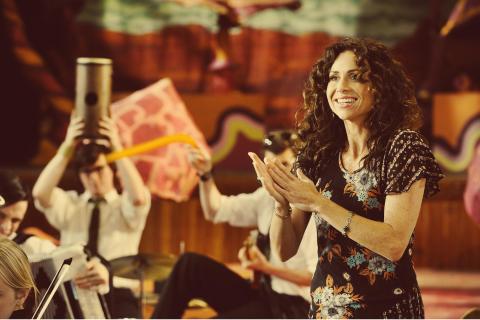SXSW Review: Hunky Dory

The nostalgic British import Hunky Dory is a pleasant trip back to the 1970s with a dynamite soundtrack and strong acting that don't quite overcome the film's predictable, slightly syrupy story.
Set in summer 1976 in the Welsh coastal city of Swansea, Hunky Dory unspools the oft-told story of a rebellious, idealistic young teacher who battles her fellow teachers and the school administration to teach in a way that connects with her students. In this case, the teacher is Vivienne (Minnie Driver), a drama teacher determined to put on an unconventional end-of-year school musical -- a space-age rock opera version of Shakespeare's The Tempest.
The school's headmaster (Robert Pugh) is skeptical, as are Vivienne's fellow teachers, who regard their young colleague as a troublemaker for her enthusiasm and openness to new ideas. They're a hidebound lot of matronly schoolmarms and jaded, chain-smoking, painfully sexist men who wish Vivienne would stop trying to show them up with her energy and passion.
Vivienne's students are mostly working-class kids with the usual teenage baggage -- troubles at home, bullying, peer pressure to conform, scholastic apathy and a host of other problems that are part and parcel of adolescent life. They're a talented bunch, but Vivienne's challenge is help the kids put their talents to good use in the face of countless distractions.
Pardon my clichéd synopsis, but Hunky Dory is a completely clichéd film. I can say without spoiling anything that thanks to Vivienne's teaching skills and knack for relating to her students, they put together an impressive show. She also helps some of them sort out their personal problems while also sorting out her own. But when an unfortunate event threatens to cancel the production, Vivienne is afraid her career may be over and hopes her colleagues will accept her, make amends and help save the show and her job.
Yep -- we've seen all this before. And I wouldn't give Hunky Dory much more thought if not for its strong points, namely an impressive cast and a generous helping of Glee-style musical numbers. Chief among the young talent is Davey (Aneurin Barnard), the show's curly-haired, golden-voiced lead actor and one of the few kids who don't give Vivienne fits. Darren Evans is also terrific as volatile misfit Kenny Loder, whose world-of-hurt life stands between him and any real direction in life. And the ever-appealing Driver does her best with an underwritten role, giving a convincing performance as a frustrated young teacher.
Hunky Dory's raison d'être is, of course, its superb music, which the young cast performs quite well (if somewhat unrealistically so). In a movie that shares its title with a 1971 David Bowie album, we would expect plenty of 1970s hits, and Hunky Dory delivers a great lineup of songs from Bowie, ELO, Nick Drake, the Beach Boys, Pink Floyd, the Who, and other artists of the era. The musical numbers give Hunky Dory a much-needed boost, quickening the pace, rousing the audience amid the film's generally low-key tone and greatly enhancing its nostalgic appeal.
While I can't recommend Hunky Dory for its story, it's a watchable film that might appeal to 1970s music buffs, a sort of warm and fuzzy Glee for middle aged music fans or younger fans of their parents' music.

